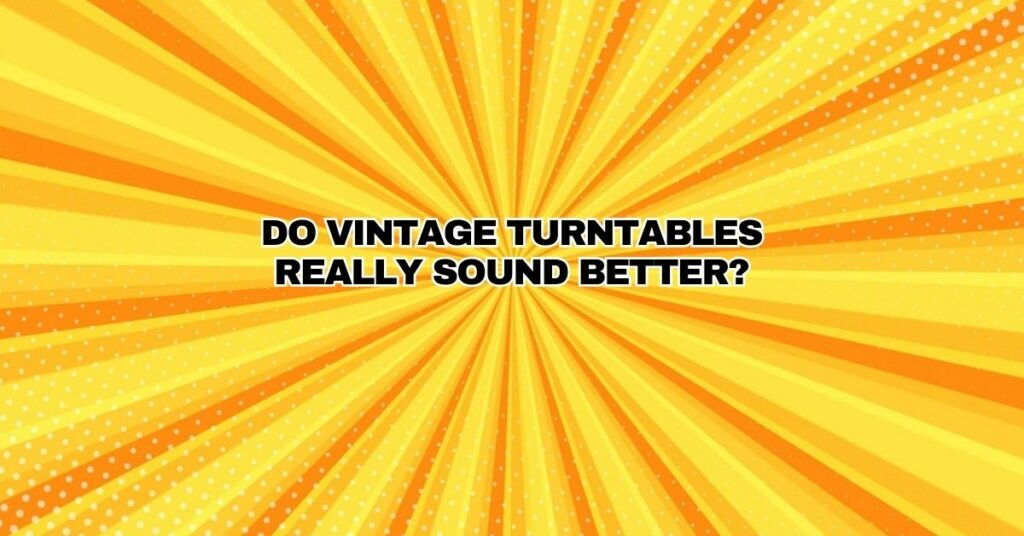In the era of technological advancements, where innovation seems endless, vinyl records have maintained their allure, sparking a resurgence of interest in the vinyl medium. The enduring charm of vinyl records has led to a fascination with vintage turntables, with many aficionados believing that these classic devices offer an unparalleled listening experience. But do vintage turntables truly sound better? In this comprehensive article, we will delve into the world of vintage turntables, exploring their unique characteristics, factors influencing their sound quality, and whether they genuinely outshine modern counterparts.
The Nostalgia of Vintage Turntables
Vintage turntables, often associated with the golden age of vinyl records, have an undeniable appeal. They evoke nostalgia for a time when music was a tactile, analog experience. These turntables, produced in the mid-20th century, come in a variety of models, including brands like Technics, Dual, Thorens, and Rega. Vintage turntables are celebrated for their craftsmanship and design, but the question remains: do they deliver superior sound quality?
The Factors That Influence Sound Quality
To answer whether vintage turntables sound better, it’s essential to consider the factors that influence sound quality:
1. Build Quality and Materials
Vintage turntables are often praised for their robust, vibration-resistant designs. They are constructed with high-quality materials, such as dense wood plinths, heavy metal platters, and precision-engineered tonearms. This construction minimizes vibrations and resonances, contributing to cleaner sound reproduction.
2. Precision Components
Vintage turntables boast precision components, such as well-crafted tonearms and premium cartridges, that minimize tracking errors and enhance playback accuracy. These components are celebrated for their simplicity and effectiveness.
3. Isolation and Vibration Control
Many vintage turntables feature rudimentary but effective isolation and vibration control mechanisms. Isolation feet and well-balanced platters help protect the turntable from external vibrations, leading to clearer and more detailed audio reproduction.
4. Cartridge and Stylus Quality
The cartridges and styli on vintage turntables vary in quality, but they often provide a distinctive analog sound. The choice of cartridge and stylus can significantly impact the turntable’s sound, making it warmer and more authentic.
The Sound of Vintage Turntables
Vintage turntables are cherished for their unique sound characteristics, including:
1. Warmth and Character
Vintage turntables are celebrated for their warmth and character. They often produce a more vintage, analog sound with a touch of nostalgia. This distinct character appeals to those who value the imperfections and charm of analog audio.
2. Vinyl’s Original Flavor
Vintage turntables have a unique ability to transport listeners back in time to the heyday of vinyl. The authentic, raw sound they produce reflects the original flavor of the music recorded in that era.
3. Analog Resonance
Analog sound enthusiasts appreciate the resonance and natural warmth of vintage turntables. They offer a unique listening experience that many find unmatched by digital counterparts.
Maintenance and Reliability
While vintage turntables offer a unique audio experience, they require maintenance and restoration to function optimally. Over time, components may degrade, and belts, styli, and cartridges may need replacement. Restoring vintage turntables can be a rewarding hobby, but it’s essential to keep in mind that maintenance is crucial for long-term reliability.
The Verdict on Vintage Turntables
In conclusion, vintage turntables offer a distinctive listening experience cherished by audiophiles who appreciate the warmth and character of analog audio. They can produce a sound that many find unmatched by modern digital technology. However, it’s important to recognize that vintage turntables vary in quality and condition, and their performance depends on factors like maintenance, restoration, and individual preferences.
Whether vintage turntables truly sound better depends on your personal taste and what you seek from your audio experience. Some may prefer the nostalgia and character of vintage sound, while others opt for modern turntables with advanced features and convenience. Ultimately, the choice between vintage and modern turntables is a matter of individual preference, the condition of the turntable, and the listening experience you desire.


